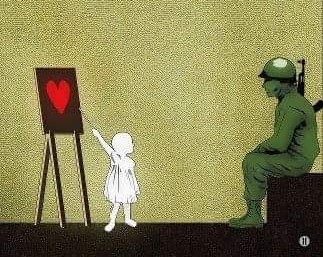En estos días parece inevitable referirse a la guerra que asola a Europa, porque, a pesar del estado de guerra permanente que se vive en varios países orientales y de América y de África, todo cobra otra relevancia cuando las bombas se dejan caer en el continente más rico del mundo.
Siendo la guerra nuestro mayor trauma, resulta incomprensible que prevalezca hasta el día de hoy como una forma válida de resolver los conflictos, porque si miramos nuestra historia ya son al menos 8 mil años de humanidad, desde la última glaciación, que se sustentan en la violencia, la conquista, la usurpación y el saqueo por parte de pueblos armados frente a vecinos más débiles.
Sin embargo, ya Cervantes nos contaba, a través del Quijote, de la existencia de una Edad Dorada en la que se ignoraban las palabras tuyo y mío y que todas las cosas eran comunes. En 1861 el jurista suizo Joham Jacob Bachofen escribió su célebre obra El derecho materno, que sirvió de fundamento a una serie de investigaciones que lograron determinar la existencia de una cultura prehistórica en la que no hay evidencias de guerra.
Esta cultura se ha denominado matrística o matrifocales y caracteriza a una Europa indígena primigenia, en la que la mujer jugaba un rol protagónico en lo social, lo político y lo espiritual y que vivió en paz hasta la irrupción de las culturas patriarcales que, no solo se adueñan de todo, sino que restringen el acceso a los bienes que antes eran comunes. La tierra no tiene dueño, el agua, los mares y el aire tampoco, ¿por qué persistir en esta ilusión de apropiación?, ¿para qué seguir con esta destrucción de vidas y pueblos, que solo traerán más miseria y desolación?
Paradójicamente, hoy que conmemoramos un nuevo día de la mujer, insistimos en la lucha, la resistencia, armadas de discursos que disparan ideas y convicciones para un buen vivir, no podemos ceder, debemos persistir, por nuestra vía, la de las palabras y el entendimiento, para desbaratar estos argumentos falaces que se sustentan en animosidades para llenar los bolsillos de especuladores y traficantes de armas.
Porque, ya lo decía Eduardo Galeano: «Las guerras dicen que ocurren por nobles razones: la seguridad internacional, la dignidad nacional, la democracia, la libertad, el orden, el mandato de la civilización o la voluntad de Dios. Ninguna tiene la honestidad de confesar: «Yo mato para robar».»
These days it seems inevitable to refer to the war that is ravaging Europe, because, despite the permanent state of war that exists in various countries in the East and in America and Africa, everything takes on another relevance when the bombs are dropped on the richest continent of the world.
Since war is our greatest trauma, it is incomprehensible that it prevails to this day as a valid way of resolving conflicts, as if we look at our history there are already at least 8 thousand years of humanity, since the last glaciation, sustained by violence, conquest, usurpation and looting by armed peoples against weaker neighbors.
However, Cervantes already told us, through Don Quixote, of the existence of a Golden Age in which the words yours and mine were ignored and that all things were common. In 1861 the Swiss jurist Joham Jacob Bachofen wrote his famous work Maternal Right, which served as the basis for a series of investigations that managed to determine the existence of a prehistoric culture in which there is no evidence of war.
This culture has been called matristic or matrifocal and characterizes a primitive indigenous Europe, in which women played a leading role in the social, political and spiritual spheres and who lived in peace until the irruption of patriarchal cultures that, not only they take over everything, but rather restrict access to goods that were previously common. The land has no owner, neither does the water, the seas and the air. Why persist in this illusion of appropriation? Why continue with this destruction of lives and peoples, which will only bring more misery and desolation?
Paradoxically, today that we commemorate a new women’s day, we insist on the struggle, the resistance, armed with speeches that trigger ideas and convictions for a good life, we cannot give up, we must persist, by our way, that of words and understanding, to disrupt these fallacious arguments that are based on animosities to fill the pockets of speculators and arms dealers.
As Eduardo Galeano already said: «Wars say they occur for noble reasons: international security, national dignity, democracy, freedom, order, the mandate of civilization or the will of God. None has the honesty to confess : «I kill to steal».»







